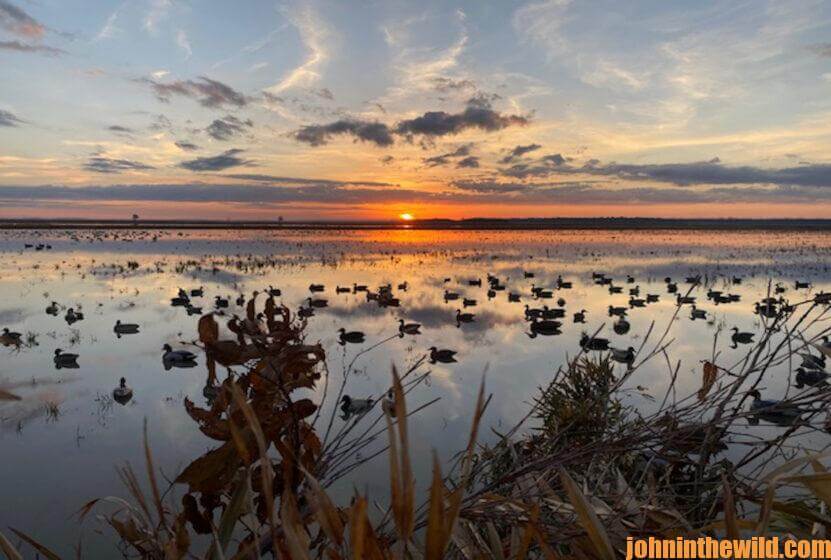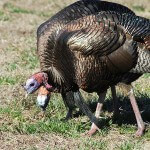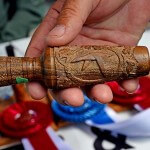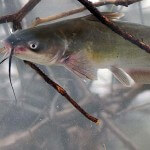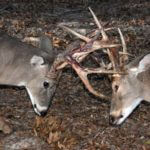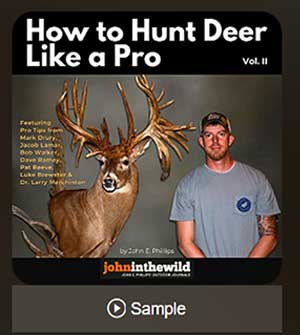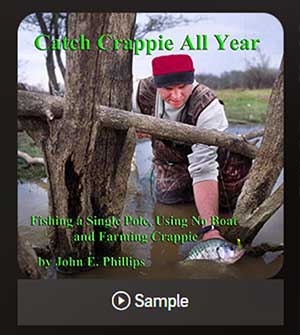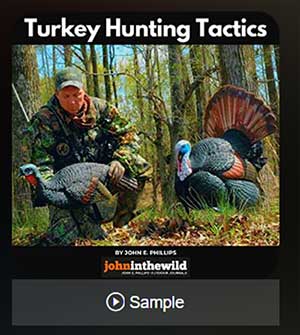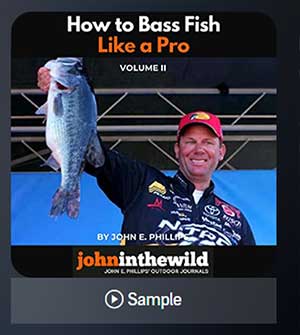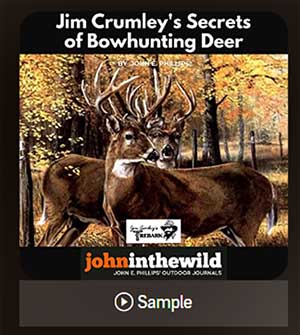Editor’s Note: Steve McCadams, 67 years old, from Paris, Tennessee, has been guiding duck hunters for 47 years. “I hunt Kentucky Lake on the Tennessee River, and I’ve got a flooded farm on the Obion River Swamp that I hunt in northwest Tennessee. When I’m hunting Kentucky Lake, that’s what we call, ‘big water hunting.’ We’re hunting backwaters off the main Tennessee River where there are mudflats, islands and sloughs. In open water, we put out fairly-big decoy spreads – usually 350-400 decoys. We take a variety of ducks on these hunts, including ringnecks, goldeneyes, buffleheads, bluebills – all diver ducks. We’ll put a few of those kind of decoys on one end of the decoy spread, but then the bulk of my spread is made up of gadwalls and mallard decoys with a few wigeons. Although we don’t take a lot of geese like we did in the 1970s, 1980s and 1990s, we’ll still put out 30-40 Canada floater decoys in the spread and some coots. Several years ago when these areas had a lot of aquatic grass, I put out more coot decoys than I do today.”
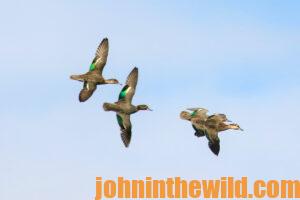 What about McCadams’ Blind and Decoys Used: McCadams’ blind is a floating blind that’s separate from his boat shed. The blind sits on 55-gallon plastic drums and is very stable. “We’ve got a stove and a kitchen where we can cook and prepare breakfast for our hunters,” McCadams explains. Because picking-up and putting-out 400-plus decoys is so labor intensive, McCadams leaves his decoy spread out during duck season. “If we have high, flooded water that changes the way the ducks come in, I’ll pull the decoy spread out and rearrange it, so the decoys are more effective.” When I asked McCadams about spinning-wing decoys, he explains, “I do put them out, but I’m not sure of when to put them in and when to take them out of my spread. There are times when I think the spinning-wing decoys help me get more ducks to come into my decoy spread, and there are other times when I think the ducks are so accustomed to seeing those spinning-wing decoys that they fly away from them. We put them out, and we take them down. There’s times when we turn them off, so the wings don’t spin, and then turn them on, so the wings do spin.”
What about McCadams’ Blind and Decoys Used: McCadams’ blind is a floating blind that’s separate from his boat shed. The blind sits on 55-gallon plastic drums and is very stable. “We’ve got a stove and a kitchen where we can cook and prepare breakfast for our hunters,” McCadams explains. Because picking-up and putting-out 400-plus decoys is so labor intensive, McCadams leaves his decoy spread out during duck season. “If we have high, flooded water that changes the way the ducks come in, I’ll pull the decoy spread out and rearrange it, so the decoys are more effective.” When I asked McCadams about spinning-wing decoys, he explains, “I do put them out, but I’m not sure of when to put them in and when to take them out of my spread. There are times when I think the spinning-wing decoys help me get more ducks to come into my decoy spread, and there are other times when I think the ducks are so accustomed to seeing those spinning-wing decoys that they fly away from them. We put them out, and we take them down. There’s times when we turn them off, so the wings don’t spin, and then turn them on, so the wings do spin.”
McCadams doesn’t use a jerk string to put motion on the water to make his decoy spread look more lifelike. Instead, he uses the Higdon Magnum duck butts (https://www.higdondecoys.com/Magnum-Duck-Butt) on batteries. They’ll wobble around like feeding ducks, putting a lot of ripples on the water to make the decoys look more lifelike. McCadams says, “I have about 8-10 of those decoys, and I also have some swimming ducks that have propellers on them that I can use to put motion in my spread. Any time the day’s really-calm and not many ripples are on the water, I’ll use these motion decoys to create ripples to simulate feeding ducks.”
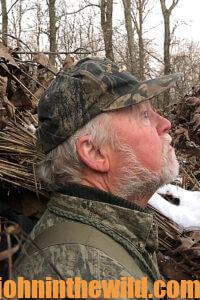 What Ducks McCadams Hunts and How he Hunts: In his open-water blind, McCadams and his hunters primarily take mallards and gadwalls, although at this blind, hunters may take six or seven different species of ducks every day. “Besides the diving ducks, we’ll also see some redheads and canvasbacks. When hunting flooded fields or timber, we don’t see very-many of the diving ducks.” When he’s hunting open water, McCadams usually will have from 6-7 shooters in his blind.
What Ducks McCadams Hunts and How he Hunts: In his open-water blind, McCadams and his hunters primarily take mallards and gadwalls, although at this blind, hunters may take six or seven different species of ducks every day. “Besides the diving ducks, we’ll also see some redheads and canvasbacks. When hunting flooded fields or timber, we don’t see very-many of the diving ducks.” When he’s hunting open water, McCadams usually will have from 6-7 shooters in his blind.
McCadams once hunted 55 to all 60 days of duck season, but now he’s only hunting 40 to 45 days. “I’ve gotten older, so I’ve backed off a little bit,” McCadams mentions. Some of the reasons McCadams has so-many people who want to hunt with him are due to not only his blind having a kitchen, his blind is also covered. Then hunters can get out of the weather, and the propane heaters in the blind keep the hunters warm on really-cold days. Although there’s no such thing as an average day of duck hunting, most days hunters will take at least 10 to 12 ducks when they hunt from McCadams’ open water blinds – although some days they’ll double that number.
What Determines the Best Duck Hunting: As most waterfowl hunters know, weather is the main factor that determines how-many ducks will be on the move, and how easy or difficult getting the ducks to come into the decoys can be. “When we’re hunting open-water, our best days are with winds,” McCadams reports. “I don’t like a 20-30 mph wind, but I do like some wind on the water. On most days, we prefer a north wind because that means there will be some ducks coming down the flyway. But we definitely want a ripple on the water because the ducks won’t come to the call or to the decoys as well when the water is slick as glass, or there’s very-little wind on the water.
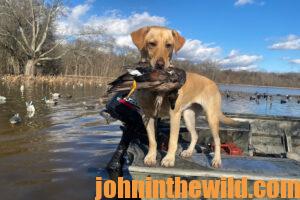 “I like cold weather because that cold weather causes shallow water, creeks and backwater sloughs to freeze-up. Then the ducks have to come to open-water places where they can get their feet wet. Generally speaking, I would say that harsh, cold weather seems to produce more ducks for my big-water blind than any other conditions do. We’re on the Mississippi Flyway, on the eastern side of Kentucky Lake, so the geese we take are usually Canadas.
“I like cold weather because that cold weather causes shallow water, creeks and backwater sloughs to freeze-up. Then the ducks have to come to open-water places where they can get their feet wet. Generally speaking, I would say that harsh, cold weather seems to produce more ducks for my big-water blind than any other conditions do. We’re on the Mississippi Flyway, on the eastern side of Kentucky Lake, so the geese we take are usually Canadas.
“We don’t get very many snow geese or specklebellies on our end of the flyway, but on the farm that I hunt on the Obion River bottoms (which is west of Kentucky Lake about 75-100 miles), a different type of terrain has numbers of flooded fields with soybeans and corn. Those geese like specklebellies and snow geese love that type of terrain. We take quite a few geese out of our blinds down on the farm.”
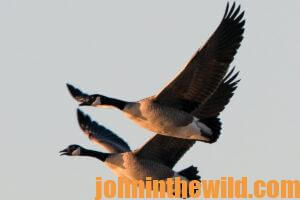 McCadams reports that although he and his hunters took numbers of Canada geese years ago, over the decades, the Canada geese seem to have moved. McCadams theory is, “Canada geese don’t migrate to the south like they did many years ago, and today, the Canada geese stop off with many of the resident geese that are living on golf courses and other water impoundments and don’t migrate. Perhaps the Canada geese that once came down to Kentucky Lake a couple decades ago started mating with the resident geese and imprinted those young geese produced from this mating to winter farther north and not come down the flyway as they once did. We still harvest a few Canada geese, but the numbers have dropped dramatically.”
McCadams reports that although he and his hunters took numbers of Canada geese years ago, over the decades, the Canada geese seem to have moved. McCadams theory is, “Canada geese don’t migrate to the south like they did many years ago, and today, the Canada geese stop off with many of the resident geese that are living on golf courses and other water impoundments and don’t migrate. Perhaps the Canada geese that once came down to Kentucky Lake a couple decades ago started mating with the resident geese and imprinted those young geese produced from this mating to winter farther north and not come down the flyway as they once did. We still harvest a few Canada geese, but the numbers have dropped dramatically.”
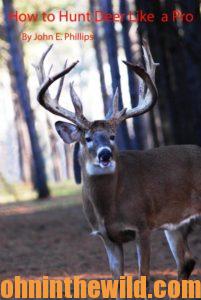 To hunt with Steve McCadams, call him at 731-676-7748; his email address is [email protected], or visit him at his Facebook page https://www.facebook.com/steve.mccadams.
To hunt with Steve McCadams, call him at 731-676-7748; his email address is [email protected], or visit him at his Facebook page https://www.facebook.com/steve.mccadams.
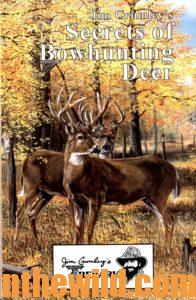 For more information about John E. Phillips’ hunting books, visit www.amazon.com/author/johnephillips. To learn more about hunting deer, check out John E. Phillips’ book, “How to Hunt Deer Like a Pro,” available in Kindle, print and Audible versions, at (http://amzn.to/YpoQHA). To learn more about hunting for deer, check out John E. Phillips’ “Jim Crumley’s Secrets of Bowhunting Deer”, now available as of January 1, 2022 in Audible, as well as paperback and Kindle at https://www.amazon.com/. You may have to copy and paste this link into your browser. (When you click on this book, notice on the left where Amazon says you can read 10% of the book for free, and you can hear 10% for free). On the right side of the page and below the offer for a free Audible trial, you can click on Buy the Audible book. Go to
For more information about John E. Phillips’ hunting books, visit www.amazon.com/author/johnephillips. To learn more about hunting deer, check out John E. Phillips’ book, “How to Hunt Deer Like a Pro,” available in Kindle, print and Audible versions, at (http://amzn.to/YpoQHA). To learn more about hunting for deer, check out John E. Phillips’ “Jim Crumley’s Secrets of Bowhunting Deer”, now available as of January 1, 2022 in Audible, as well as paperback and Kindle at https://www.amazon.com/. You may have to copy and paste this link into your browser. (When you click on this book, notice on the left where Amazon says you can read 10% of the book for free, and you can hear 10% for free). On the right side of the page and below the offer for a free Audible trial, you can click on Buy the Audible book. Go to
https://www.amazon.com/ to learn about John and Denise Phillips’ cookbook, available in Kindle and print, “The Best Wild Game and Seafood Cookbook” that includes an entire chapter on bird recipes, including recipes for their favorite duck dishes.
Tomorrow: More Steve McCadams’ Duck Tactics



